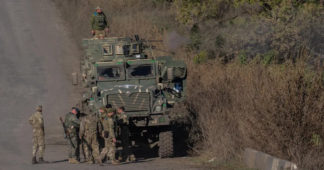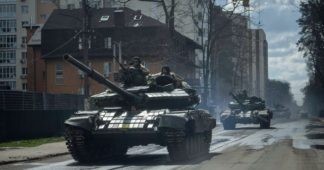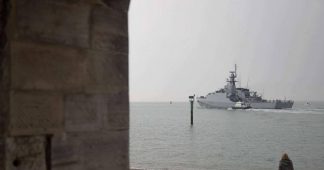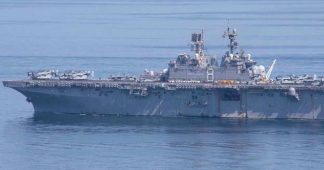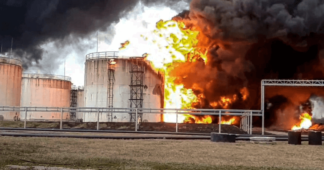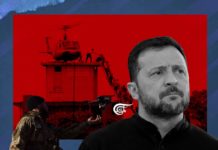By Andre Damon
May 26, 2023
Following the Biden administration’s announcement at last week’s G7 meeting that it would send F-16 fighter aircraft to Ukraine, the US and its Ukrainian proxy forces have carried out a series of provocative actions aimed at further escalating the conflict.
As the Ukrainian military continues to suffer military setbacks on the ground—most clearly demonstrated by the fall of Bakhmut—the US and the NATO powers are preparing for the potential direct entry of air, land and sea forces into the conflict.
On Wednesday, the USS Gerald R. Ford arrived in Oslo, Norway. The USS Ford is the largest warship ever constructed and the first of a new generation of such carriers commissioned by the United States.
The carrier strike group led by the Ford includes two nuclear-powered attack submarines, two Ticonderoga-class cruisers and a squadron of destroyers. Manning the strike group are many thousands of naval military personnel, who will be operating within striking distance of Russian territory.
Vice Admiral Thomas E. Ishee, the commander of the US Sixth Fleet, explained that upon leaving Oslo the carrier strike group would travel north to the Arctic to carry out “freedom of navigation” operations—a term used by the United States to describe provocatively sailing ships into contested waters.
In other words, this massive armada with its thousands of troops will sail near the Russian coastline under conditions of a rapidly escalating proxy war that Biden said last year would threaten a nuclear “Armageddon.”
What weapons this massive armada carries are not known to the public. While the United States has a policy of neither confirming or denying the presence of nuclear weapons on its warships, leading US military think tanks have for years advocated the deployment of tactical nuclear weapons on US carriers.
The deployment of the carrier to Norway is part of a series of major escalations of the conflict.
On Monday, a group of far-right Russian militia men, operating in coordination with the Ukrainian military, crossed into Russia, carrying out a series of attacks on the Belgorod region. Russian officials showed images of the militia driving US-provided vehicles, including MRAPs, the heavily armored vehicles developed for the US wars in Iraq and Afghanistan.
On Wednesday, the New York Times published an article confirming that a series of drone attacks on the official residence of Russian President Vladimir Putin were carried out by a faction of the Ukrainian state, allegedly without the foreknowledge of Zelensky or the United States.
Perhaps most provocatively, in an interview with the right-wing German daily newspaper Die Welt, Vadym Skibitsky, deputy head of Ukraine’s military intelligence service, said that the Ukrainian government officially supports the assassination of Putin and directly carries out attacks inside Russia.
In an article entitled, “Putin is at the top of the list. We’re trying to kill him,” Skibitsky is asked, “Who is at the top of the [kill] list?” to which he replies, “Putin, because he coordinates and decides what happens.”
Asked, “Are the attacks in the north, in Russia, also carried out by you: on the railways, warehouses and airports?” Skibitsky replies, “All supplies come from Rostov or via the Crimea.” The interviewer asks, “And you will attack these areas too?” Skibitsky answers, “Of course. If there is fuel, weapons and ammunition there, it will be destroyed.”
The official declaration by a leader of the Ukrainian intelligence forces that it is a state policy to seek to murder the president of Russia makes all the more ominous the statement by US Secretary of State Antony Blinken following the May 3 drone attacks on the Kremlin. When asked if the US supports “such attacks on leadership.” he replied, “These are decisions for Ukraine to make about how it’s going to defend itself.”
The clear conclusion is that strikes inside Russia, including the assassination attempt on Putin—which the press now admits was carried out by Ukraine—are done in the closest coordination and with the approval of the United States.
US officials are increasingly openly advocating attacks on Russian territory. On Thursday, a far-right reporter asked Democratic Congressman Jerrold Nadler, “Are you concerned that [Ukrainian forces] will enter into Russian territory?” To which Nadler replied, “I’m not concerned. I wouldn’t care if they did.”
In its own desperate and reckless response to the provocative US efforts to expand the conflict, Moscow announced that it would be stationing tactical nuclear weapons in neighboring Belarus. “In the context of an extremely sharp escalation of threats on the western borders of Russia and Belarus, a decision was made to take countermeasures in the military-nuclear sphere,” Russian Defense Minister Sergei Shoigu said.
Earlier this week, the World Socialist Web Site noted that the decision to send F-16 fighter jets to Ukraine was, in fact, worked out months earlier, as part of a long-term plan to expand US involvement in the war with Russia. “While the Biden administration is operating with a systematic plan to escalate the war,” we wrote, “all of its actions are presented as semi-spontaneous, reactive responses to external ‘pressure.’”
This analysis was confirmed, almost word for word, in statements Thursday from Joint Chiefs of Staff Chairman Mark Milley. He explained, “It’s not a question of will we agree later or agree now or under pressure. That’s not at all with what’s getting done here. This was hardcore military analysis that looks at cost, benefit and risk, and what is the need on the battlefield now and in the near future.”
Contrary to the presentation in the media, the closed-door meetings at the G7 summit last weekend were not over the sending of fighter jets. Rather, as the WSWS wrote, they “served two purposes: First, to bring into line any dissidents in the cabal of imperialist conspirators, and, second, to discuss the overriding question: What next?”
It has not taken long for the answer to the question, “What next?”, to emerge in developments. Confronting military setbacks in Ukraine and an escalating economic, social and political crisis at home—above all, in the explosive growth of the class struggle—the capitalist ruling elites, as Trotsky wrote on the eve of World War II, “toboggan with eyes closed” toward catastrophe.
We remind our readers that publication of articles on our site does not mean that we agree with what is written. Our policy is to publish anything which we consider of interest, so as to assist our readers in forming their opinions. Sometimes we even publish articles with which we totally disagree, since we believe it is important for our readers to be informed on as wide a spectrum of views as possible.
